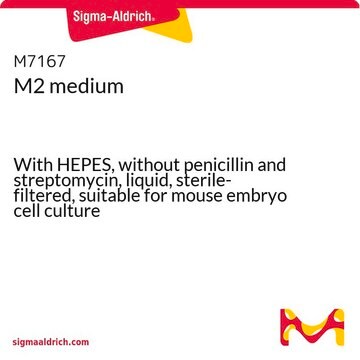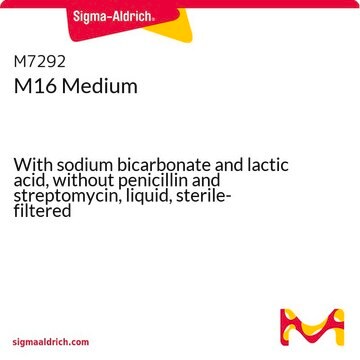MR-101
EmbryoMax® Advanced KSOM Embryo Medium
EmbryoMax Advanced KSOM Medium can be used as a single medium to harvest and culture preimplantation mouse embryos, replacing the normal 2-step system where one medium is used for embryo harvest and another is used for culture.
Synonym(s):
K+ Simplex Optimised Medium (KSOM), KSOM Mouse Embryo Media
Sign Into View Organizational & Contract Pricing
All Photos(1)
About This Item
UNSPSC Code:
12352207
eCl@ss:
32160801
NACRES:
NA.71
Recommended Products
Quality Level
form
liquid
manufacturer/tradename
Specialty Media
EmbryoMax®
technique(s)
cell culture | embryo: suitable
cell culture | stem cell: suitable
input
sample type: mouse embryo(s)
General description
EmbryoMax Advanced KSOM Medium is a new, uniquely buffered modified version of KSOM that can be used as a single medium to harvest and culture preimplantation mouse embryos. The medium will maintain pH out on the bench top and also grow embryos in vitro, replacing the normal 2-step system where one medium is used for embryo harvest and another is used for culture. The Advanced KSOM medium has been shown to produce a higher frequency of blastocyst formation in multiple mouse strains after 72 hours in culture when compared to standard KSOM medium.
Traditionally, retrieving and then growing mouse embryos in vitro is usually a 2-step system. Embryos are commonly removed from the oviducts in a HEPES buffered medium (e.g. M2, FHM), which maintain their pH in air. The embryos are then transferred into a second medium which is bicarbonate buffered (e.g. M16, CZB, KSOM) and placed in a CO2 incubator in order to maintain the pH of the medium. Furthermore, the bicarbonate buffered medium needs to be pre-equilibrated in the incubator for several hours prior to receiving embryos to achieve optimal growth. The EmbryoMax Advanced KSOM Medium enables both embryo handling in atmospheric conditions and culturing in a CO2 incubator with a single medium. No medium pre-equilibration step is necessary for embryo harvest, but pre-equilibration is recommended for culture.
Traditionally, retrieving and then growing mouse embryos in vitro is usually a 2-step system. Embryos are commonly removed from the oviducts in a HEPES buffered medium (e.g. M2, FHM), which maintain their pH in air. The embryos are then transferred into a second medium which is bicarbonate buffered (e.g. M16, CZB, KSOM) and placed in a CO2 incubator in order to maintain the pH of the medium. Furthermore, the bicarbonate buffered medium needs to be pre-equilibrated in the incubator for several hours prior to receiving embryos to achieve optimal growth. The EmbryoMax Advanced KSOM Medium enables both embryo handling in atmospheric conditions and culturing in a CO2 incubator with a single medium. No medium pre-equilibration step is necessary for embryo harvest, but pre-equilibration is recommended for culture.
Application
EmbryoMax Advanced KSOM Medium can be used as a single medium to harvest and culture preimplantation mouse embryos, replacing the normal 2-step system where one medium is used for embryo harvest and another is used for culture.
Research Category
Stem Cell Research
Stem Cell Research
Storage and Stability
Can be stored at -20°C up to the expiration date on the bottle.
Once thawed it should be used within 2 weeks.
Note: Our EmbryoMax Liquid Mouse Embryo Media is produced on a bi-monthly basis. For regular users, we encourage standing orders to ensure that backorders do not occur.
Once thawed it should be used within 2 weeks.
Note: Our EmbryoMax Liquid Mouse Embryo Media is produced on a bi-monthly basis. For regular users, we encourage standing orders to ensure that backorders do not occur.
Legal Information
EmbryoMax is a registered trademark of Merck KGaA, Darmstadt, Germany
Disclaimer
Unless otherwise stated in our catalog or other company documentation accompanying the product(s), our products are intended for research use only and are not to be used for any other purpose, which includes but is not limited to, unauthorized commercial uses, in vitro diagnostic uses, ex vivo or in vivo therapeutic uses or any type of consumption or application to humans or animals.
Signal Word
Warning
Hazard Statements
Precautionary Statements
Hazard Classifications
Skin Sens. 1
Storage Class Code
12 - Non Combustible Liquids
WGK
WGK 3
Flash Point(F)
Not applicable
Flash Point(C)
Not applicable
Certificates of Analysis (COA)
Search for Certificates of Analysis (COA) by entering the products Lot/Batch Number. Lot and Batch Numbers can be found on a product’s label following the words ‘Lot’ or ‘Batch’.
Already Own This Product?
Find documentation for the products that you have recently purchased in the Document Library.
Customers Also Viewed
Jiho Choi et al.
Cell stem cell, 20(5), 706-719 (2017-04-04)
Blastocyst-derived embryonic stem cells (ESCs) and gonad-derived embryonic germ cells (EGCs) represent two classic types of pluripotent cell lines, yet their molecular equivalence remains incompletely understood. Here, we compare genome-wide methylation patterns between isogenic ESC and EGC lines to define
Kenji Sugioka et al.
Developmental cell, 46(3), 257-270 (2018-07-24)
Cell division axes during development are specified in different orientations to establish multicellular assemblies, but the mechanisms that generate division axis diversity remain unclear. We show here that patterns of cell contact provide cues that diversify cell division orientation by
Negin P Martin et al.
Journal of visualized experiments : JoVE, (141) (2018-11-20)
Lentiviruses are efficient vectors for gene delivery to mammalian cells. Following transduction, the lentiviral genome is stably incorporated into the host chromosome and is passed on to progeny. Thus, they are ideal vectors for creation of stable cell lines, in
Our team of scientists has experience in all areas of research including Life Science, Material Science, Chemical Synthesis, Chromatography, Analytical and many others.
Contact Technical Service




